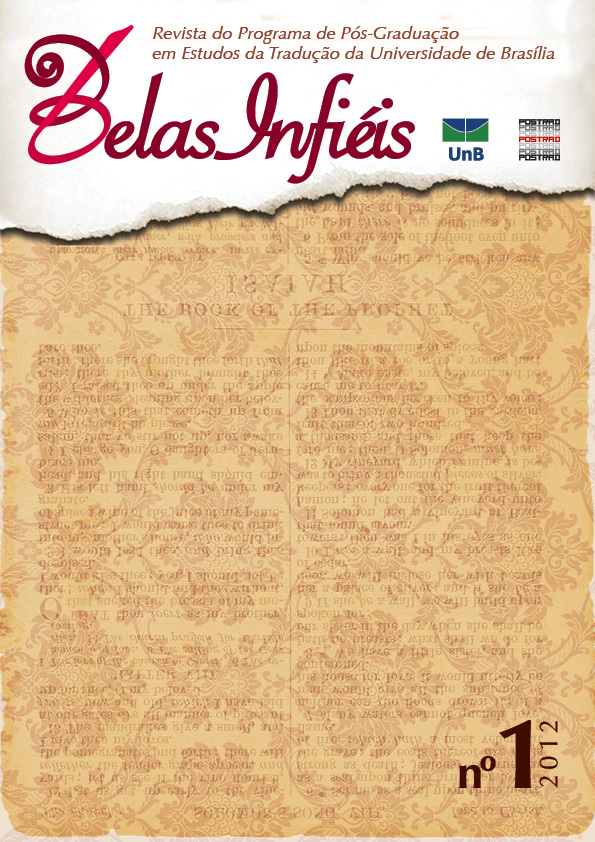THE RELEVANCE OF DISCOURSE ANALYSIS FOR TRANSLATION STUDIES
DOI :
https://doi.org/10.26512/belasinfieis.v1.n1.2012.11167Mots-clés :
Discourse Analyses, Translation Studies, Discourse Analyses and Translation StudiesRésumé
The present study aims at promoting a reflection on the relevance of the Discourse Analysis for the Translation Studies based on the theories of the main researchers for both areas. To do so, this paper is divided into three sections. In the first section, we deal with Discourse Analysis theories based on Brown and Yule (1983); Fairclough (1992) and Hatim and Mason (1990). In the second section, we present some aspects of the theories related to Translation Studies. In the following section, we raise some reflections regarding the interface Discourse Analysis and Translation Studies according to the theories presented previously. Finally, we present the conclusions concerning the research carried out in this paper.
Téléchargements
Références
BROWN, Gillian; YULE, George. Discourse Analysis.Cambridge: Cambridge University Press, 1983.
FAIRCLOUGH, Norman. Critical Language Awareness. London: Longman, 1992.
HATIM, Basil; MASON, Ian.Discourse and the Translator.London: Longman, 1990.
JAWORSKI, Adam; COUPLAND, Nikolas (Org.). TheDiscourse Reader.London and New York: Routledge, 1999.
HOLMES, James. The Name and nature of Translation Studies.In: VENUTTI, L. (Ed.). 2000.
MALMKJAER, Kirsten. Translation and Language Teaching. Manchester: St. Jerome Publishing, 1998.
McCARTHY, Michael.Discourse Analysis for Language Teachers. Cambridge: Cambridge University Press, 1991.
McCARTHY, Michael; CARTER, Ronald. Language as Discourse: Perspectives for Language Teaching. London: Longman, 1994.
MUNDAY, Jeremy. The Routledge Companion to TranslationStudies.Revised Edition. New York: 2009.
NIDA, Eugene.The Principles of Discourse Structure and Content in Relation to Translating.In: KLAUDY, K.; KOHN, J. Proceedings of the 2ndInternational Conference on Current Trends in Studies of Translating and Interpreting.Budapeste: Scholastica, p. 37-43, sept. 1996.
NORD, Christiane. Text Analysis in Translation.2nded.Beijing: FLT and Research Press, 2006.
SCHAFFNER, Cristina. The role of Discourse Analysis for Translation and Translator Training. Clevedon: Multilingual Matters, 2002.
SCHIFFRIN, Deborah. Approaches to Discourse.Oxford: Blackwell, 1994.
TORO, Cristina García. Translation Studies: an overview.Cadernos de Tradução.vol. 2, n.20, 2007. Disponível em:<http://www.periodicos.ufsc.br/index.php/traducao/article/view/1001>. Acessado em: 8 jun. 2012.
TROSBORG, Anna. Discourse Analysis as Part of Translator Training. In: SCHAFFNER, Cristina. The role of Discourse Analysis for Translation and Translator Training.Clevedon:Multilingual Matters, 2002.
Téléchargements
Publié-e
Comment citer
Numéro
Rubrique
Licence
Copyright Statement
Given the public access to this journal, the texts are free to use but requires the recognition of the original authorship and initial publication in this journal to be properly stated.
The journal allows the use of works published for non-commercial purposes, including the right to submit the work to publicly accessible databases. Published contributions are the sole and exclusive responsibility of the author(s).
- When submitting papers to be evaluated by the Belas Infiéis journal, the author(s):
- Declare that the contents of the contributions are original and of their original creation, being entirely responsible for their content if there is an objection by third parties.
- Claim to be aware that they should not commit academic plagiarism.
- Declare that the manuscript has not been published, completely or partially, in Portuguese or another language. If it is a translation it should be submitted to the Translated Articles section.
- Declare that the manuscript is not being evaluated by other journals.
- Declare that the manuscript was not submitted to another journal simultaneously.
- Commit(s) to inform the journal of any kind of error or inaccuracy in their contribution (published, in evaluation or in editing) and to collaborate with the editors to make due corrections of the article (when in evaluation or editing) or erratum/retraction (after publication).
- Declare that there is no conflict of interest regarding the published work.
- Authorize its release if it is accepted for publication without any kind of monetary compensation.
- Agree to assign non-exclusive rights to publication to the magazine, remaining free to make their contribution available in other media as long as the publication of the first version in Belas Infiéis magazine is mentioned. They also authorize Belas Infiéis to assign their texts for reproduction in content indexers, virtual libraries and similar platforms.
- Maintain copyright and grant the journal the right of first publication, the work being licensed under theCreative Commons Attribution License.
- Is/Are allowed and encouraged to publish and distribute their work online after the editorial process, which may increase the impact and citation of the published work.
- Authorize the editorial team to make textual adjustments and to adapt the article to the publication rules, when necessary.



















